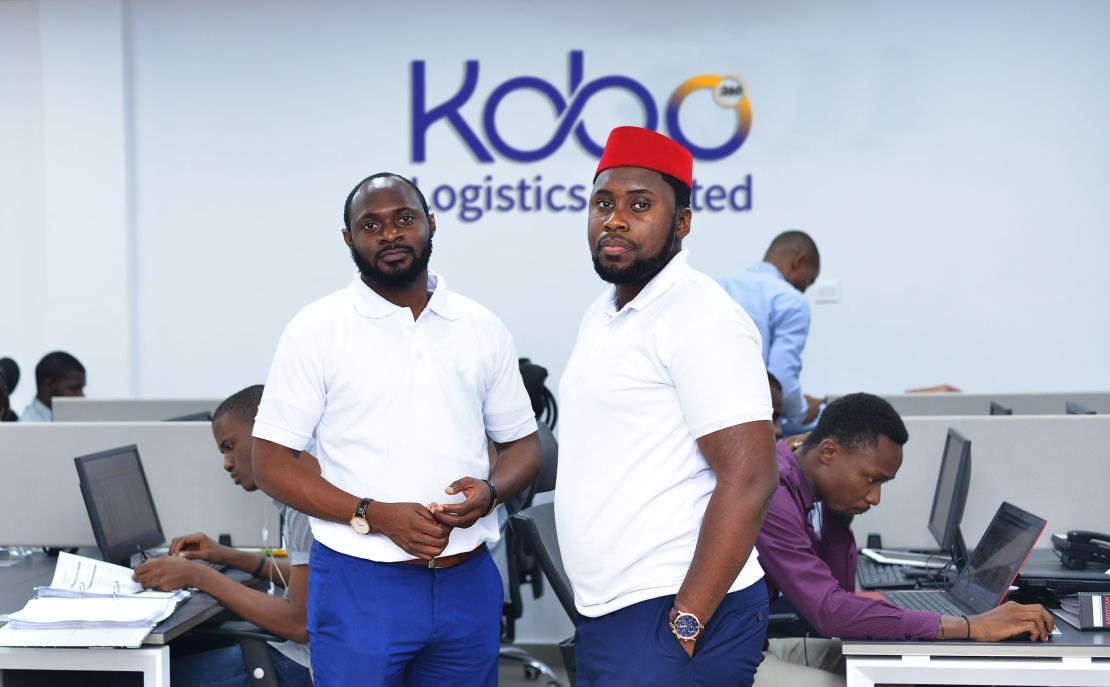Transporting goods quickly and cheaply is vital for trade, but it’s a struggle in many African nations. Now a startup is hoping to change that.
Nigerian entrepreneur Obi Ozor experienced the slow movement of cargo first-hand a few years ago when he was importing diapers and transporting them across Nigeria.
“It used to take one week to transport goods 1,000 km, from Lagos to Kano,” he told CNN Business.
“Africa’s logistics is very informal, making it challenging for many businesses to move goods efficiently,” he added. “There’s a serious disconnect between getting goods from A to B.”
In 2017, Ozor and fellow Nigerian Ife Oyedele II launched digital platform Kobo360. A self-styled “Uber (UBER) for trucks,” it connects truck owners and drivers with cargo companies, aiming to make supply chains more efficient, affordable and transparent.
As measures to control the spread of the coronavirus are rolled out across Africa, restrictions on movement are having an impact on a supply chain that was already struggling. Most African countries rank poorly in the World Bank’s 2018 Logistics Performance Index, because of poor infrastructure, corruption and inefficiency.
Nigeria loses an estimated $19 billion annually because of red tape, delays and corruption at its ports, according to a 2018 report by the Lagos Chamber of Commerce.
Kobo360 can help ease those delays, said Ozor. Instead of having to visit a truck park to find a driver, cargo companies can choose one online. Once the match is made, drivers receive half of their payment immediately. Kobo360 also provides routes that avoid roads targeted by armed bandits.
On each trip, drivers can report incidents and share information with the app. “Our technology makes recommendations based on real-time information on factors relevant to trucking, reported by truckers,” Ozor said. “We send notifications in advance so a truck driver can plan around them.”
By providing drivers with information about weather and traffic conditions and matching them directly with companies, Ozor said Kobo360 can cut the time for a 1,000 km journey down from one week to three days.

Expanding across Africa
Kobo360 has worked with around 50,000 truck drivers in Nigeria, Togo, Ghana, Kenya and Uganda to help them transport over 760 million kilos (1.67 billion pounds) of goods, worth an estimated $200 billion, according to Ozor.
The company charges drivers between 5% and 10% of their fee, and in return “adds value by linking them [drivers] with goods for their return journey,” he added.
Companies using the platform include Unilever (UL), Maersk and Procter & Gamble (PG). According to Ozor, Kobo360 users save an average of about 7% in logistics costs and the app allows them to track the movement of their goods in real time.
Kobo360 has raised around $37 million in investment. In August, the company raised $20 million in a funding round led by Goldman Sachs (GS).
“Kobo360’s on-demand logistics offering has generated impressive traction and we are excited to support Obi, Ife and the team as they harness technology to tackle one of Africa’s most pressing development challenges,” Jules Frebault, head of the Africa Special Situations Group at Goldman Sachs, told CNN Business.
The company will use the funding to expand into Egypt, Tanzania, Ivory Coast and the Middle East and aims to get 1.2 million truck drivers using the platform within three years.
A more immediate challenge is managing the transport restrictions put in place to slow the spread of coronavirus. Kobo360 said its drivers have faced delays at ports and borders, and that the volume of goods moved across the continent has dropped by a third.
Kobo360 added that it’s vital that governments give clear directives allowing the free movement of trucks carrying essential goods. “Our focus is on ensuring food security for the continent, working with suppliers to ensure safe and seamless fulfillment,” Ozor said.





